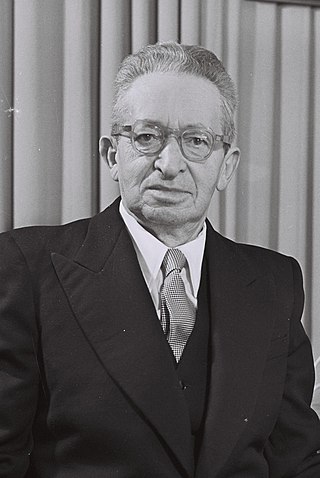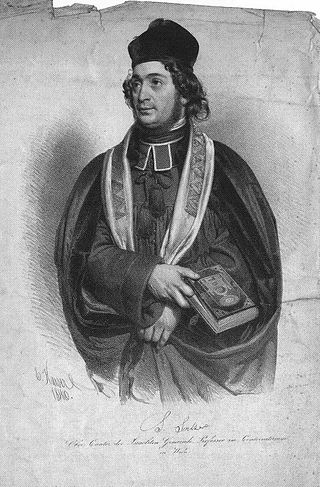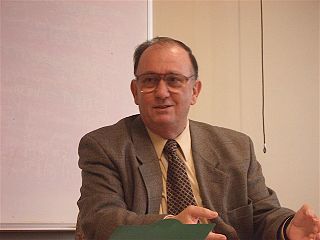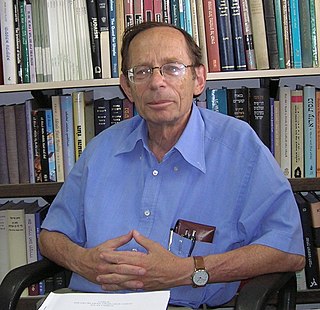
The Talmud is, after the Hebrew Bible, the central text of Rabbinic Judaism and the primary source of Jewish religious law (halakha) and Jewish theology. Until the advent of modernity, in nearly all Jewish communities, the Talmud was the centerpiece of Jewish cultural life and was foundational to "all Jewish thought and aspirations", serving also as "the guide for the daily life" of Jews. The Talmud includes the teachings and opinions of thousands of rabbis on a variety of subjects, including halakha, Jewish ethics, philosophy, customs, history, and folklore, and many other topics.

Yitzhak Ben-Zvi was a historian, ethnologist, Labor Zionist leader and the longest-serving President of Israel. He was first elected on 8 December 1952, assumed office on 16 December 1952, and continued to serve in the position until his death.

The Great Synagogue of Rome is an Orthodox Jewish congregation and synagogue, that is located at Lungotevere de' Cenci, in Rome, in Lazio, Italy. Designed by Vincenzo Costa and Osvaldo Armanni in an eclectic mix of Historicism and Art Nouveau styles, the synagogue was completed in 1904. It is the largest synagogue in Rome.

Salomon Sulzer was an Austrian hazzan (cantor) and composer.
Italian Jews or Roman Jews can be used in a broad sense to mean all Jews living in or with roots in Italy, or, in a narrower sense, to mean the Italkim, an ancient community living in Italy since the Ancient Roman era, who use the Italian liturgy as distinct from those Jewish communities in Italy dating from medieval or modern times who use the Sephardic liturgy or the Nusach Ashkenaz.

Edwin Seroussi is an Israeli musicologist of Uruguayan origin. He is the Emanuel Alexandre Professor Emeritus of Musicology, chair of the Academic Committee of the Jewish Music Research Centre at the Hebrew University of Jerusalem and a visiting scholar in Jewish studies at Dartmouth College. He is the 2018 Israel Prize laureate in the field of Musicology. In 2024 he became a member of the Israel Academy of Sciences and Humanities
The Centro Nazionale di Studi di Musica Popolare is a scholarly center for music studies in Italy. It is housed on the premises of the National Academy of Santa Cecilia in Rome.

Yehuda (Leo) Levi was a German-born American-Israeli Haredi rabbi, physicist, writer and educator. He was Rector and Professor of Electro-optics at the Jerusalem College of Technology. Levi was best known as the author of several books on Science and Judaism, and Judaism in contemporary society, as well as on physics.

Sergio Della Pergola is an Italian-Israeli demographer and statistician. He is a professor and demographic expert, specifically in demography and statistics related to the Jewish population.
Ephraim Elimelech Urbach was a distinguished scholar of Judaism. He is best known for his landmark works on rabbinic thought, The Sages, and for research on the Tosafot. He was a candidate to presidency in Israel in 1973, but wasn't elected.
Asher Salah is an Israeli historian. He is one of the leading specialists in the literature of the Italian Jews, and a translator of Hebrew literature. He has written extensively in cinema studies and contemporary Middle East politics working as a columnist for several Italian newspapers.
Don Harran was professor of musicology at the Hebrew University of Jerusalem.

The culture of Rome in Italy refers to the arts, high culture, language, religion, politics, libraries, cuisine, architecture and fashion in Rome, Italy. Rome was supposedly founded in 753 BC and ever since has been the capital of the Roman Empire, one of the main centres of Christianity, the home of the Roman Catholic Church and the seat of the Italian Republic. Due to its historical and social importance, Rome has been nicknamed the Caput Mundi, or "capital of the world".

Michael Edward Stone is a professor emeritus of Armenian Studies and of Comparative Religion at the Hebrew University of Jerusalem. His research deals with Armenian studies and with Jewish literature and thought of the Second Temple period. He is also a published poet.
Abraham de Caceres or Casseres was a Dutch Jewish composer of the late baroque period.
Alexander Rofé is and author and Professor Emeritus of the Bible at the Hebrew University of Jerusalem.

Levi Cooper is an Orthodox Jewish teacher, author, and community leader who lives in Tzur Hadassah, Israel. He is a faculty member of the Pardes Institute for Jewish Studies in Jerusalem, where he teaches Midrash, Talmud, Rambam, and Hasidism. Originally from Australia, Cooper lectures extensively on the topics of law and Halakha, Jewish spirituality and Hasidic thought. Since 1996, he has also served as a historian with Heritage Seminars. He has studied at Chabad, Yeshivat Sha'alvim, the Kollel at Bar-Ilan University and Beit Morasha.

Gerald Blidstein was professor emeritus of Jewish philosophy at Israel's Ben-Gurion University of the Negev. He was the Israel Prize laureate in Jewish philosophy (2006) and had been a member of the Israel Academy of Sciences since 2007.

Joseph (Yossi)Chetrit is Emeritus Professor of the French language and literature department and the Hebrew language department at the University of Haifa, former head of the Centre for the Study of Jewish Culture in Spain and Muslim Countries, and founder of the Tsfon-Maarav Troupe.
Giovanni Garbini was an Italian Orientalist and Semitist. His biblical studies revealed historical omissions and helped scholars to interpret the biblical narrative in the larger context of the history of the ancient Near East. He worked as a university lecturer in the Istituto Universitario Orientale in Naples, at the Scuola Normale in Pisa and finally in Sapienza in Rome until his retirement. He was a member of the Lincean Academy since 1990, and a member of the Leone Caetani foundation for Islamic studies.












